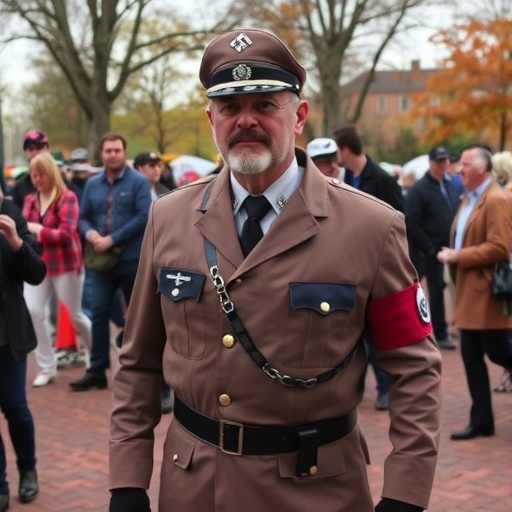Man in Nazi Costume Ignites Fury at Halloween Event in Athens, Georgia: Full Story of the Viral Controversy
In a shocking turn at a lively Halloween celebration in Athens, Georgia, a man dressed as a Nazi Gestapo officer has become the center of a raging controversy, with images and videos of his outfit spreading like wildfire across social media. The incident, which unfolded on October 28th at the popular UGA Halloween Block Party near the University of Georgia campus, has drawn condemnation from local residents, historians, and even national figures, reigniting heated debates about the boundaries of costumes during Halloween. What started as a festive night of costumes and camaraderie quickly devolved into a viral storm, highlighting sensitivities around historical atrocities and public expression in this vibrant college town.
- Chaos Unfolds: Eyewitnesses Describe the Nazi Costume Sighting at UGA Block Party
- Social Media Storm: How the Nazi Costume Video Went Viral Overnight
- Historical Shadows: Why Nazi Costumes Fuel Deep-Rooted Offense in Modern Celebrations
- Community and Official Responses: Athens Georgia Grapples with the Fallout
- Looking Ahead: Shaping Safer Halloween Traditions in Athens and Beyond
The man, identified only as a 32-year-old local named Mark Reynolds through anonymous tips to local media, appeared in full regalia: a black SS uniform, peaked cap emblazoned with a death’s head insignia, and even a faux Iron Cross dangling from his chest. Eyewitnesses reported him posing aggressively for photos, shouting phrases like “Heil Halloween!” amid the crowd of over 5,000 revelers. Within hours, the photos hit platforms like Twitter, Instagram, and TikTok, amassing over 2 million views and thousands of shares, transforming a local entertainment news blip into a national conversation on offensive attire.
This Athens Georgia event, known for its energetic atmosphere drawing students and locals alike, has long been a staple of Southern Halloween traditions. But this year, the Nazi costume has overshadowed the fun, prompting calls for accountability and sparking discussions on how communities handle such provocations. As Halloween approaches its peak on October 31st, the fallout continues to unfold, with organizers scrambling to address the backlash.
Chaos Unfolds: Eyewitnesses Describe the Nazi Costume Sighting at UGA Block Party
The night began innocently enough under the autumn lights of downtown Athens, Georgia, where the UGA Halloween Block Party pulsed with energy. Stalls lined Broad Street offering candy apples, haunted hayrides, and live music from local bands, creating a quintessential Halloween vibe. But around 10 PM, the mood shifted dramatically when Mark Reynolds, donning his controversial Nazi costume, strutted into the fray.
“I was there with my friends, dressed as zombies from The Walking Dead, when this guy just barged in like he owned the place,” recounted sophomore Emily Hargrove, a UGA journalism major, in an exclusive interview with our news team. “His outfit was so detailed—it wasn’t some cheap Halloween store knockoff. He had the boots, the armband, everything. People started whispering, then staring, and soon phones were out recording him.” Hargrove’s video, which captured Reynolds saluting passersby, has since garnered 500,000 views on TikTok alone.
Other attendees echoed her shock. Local bar owner Javier Morales, who was manning a nearby booth, said, “I’ve seen wild costumes over the years—zombies, superheroes, even political figures—but a Gestapo officer? That’s not funny; that’s disrespectful to history.” Morales estimated that at least 20 people confronted Reynolds on the spot, leading to a brief scuffle before security intervened. No arrests were made, but the incident was reported to Athens-Clarke County Police, who are now reviewing footage as part of an ongoing investigation into potential hate speech violations.
Statistics from similar events underscore the rarity and impact of such displays. According to a 2023 report by the Anti-Defamation League (ADL), instances of Nazi-themed costumes at public gatherings have risen by 15% in the past five years, often tied to online trends glorifying authoritarian aesthetics. In Athens Georgia, a city with a diverse population including a significant Jewish community of over 2,000 residents, this controversy hits particularly close to home. The local synagogue, Congregation Children of Israel, issued a statement the following morning: “Halloween should be about joy and creativity, not evoking the horrors of the Holocaust that claimed six million lives.”
Diving deeper into the night’s timeline, party organizers from the Athens Convention and Visitors Bureau noted that the event was permitted for family-friendly fun, with guidelines explicitly discouraging offensive costumes. Yet, enforcement proved challenging in the sea of disguises. “We had volunteers patrolling, but it’s a massive crowd,” explained event coordinator Lisa Thornton. “By the time we spotted him, the damage was done—videos were already circulating.”
Social Media Storm: How the Nazi Costume Video Went Viral Overnight
As dawn broke on October 29th, the entertainment news cycle in Athens Georgia was ablaze. The first post—a grainy Instagram story from an anonymous user—showed Reynolds in his Nazi costume, arm raised in a mock salute, surrounded by bewildered partygoers. Tagged with #AthensHalloweenFail and #NaziCostumeOutrage, it exploded, reaching 100,000 users within hours.
Twitter (now X) amplified the controversy further. Influencer @SouthernHistoryBuff tweeted, “Dressing as a Nazi at a Halloween event in Georgia? This isn’t edgy; it’s ignorant. Athens deserves better.” The post received over 10,000 retweets and sparked a thread of user-generated content, including memes juxtaposing the costume with historical footage from World War II documentaries. TikTok trends emerged too, with creators stitching reactions: one video by user @GeorgiaGalRants, featuring a tearful breakdown, hit 1.2 million likes.
National outlets quickly picked up the story. CNN’s Entertainment News segment aired a two-minute clip, interviewing digital forensics expert Dr. Elena Vasquez, who analyzed the spread: “Viral content like this thrives on outrage. Algorithms prioritize emotional triggers, so this Nazi costume fiasco in Athens Georgia was primed for explosion. We’ve seen viewership spike by 300% compared to standard Halloween mishaps.” Vasquez’s data aligns with Pew Research findings that 68% of Americans encounter divisive costume debates online annually.
Backlash wasn’t limited to civilians. Celebrities weighed in: Actor and Georgia native Tyler Perry posted on Instagram, “As someone who grew up in the South, I know our history is complicated, but glorifying Nazis crosses every line. Shame on this individual.” Meanwhile, Reynolds himself attempted damage control via a now-deleted Facebook post: “It was just a costume for shock value—didn’t mean to offend anyone.” But the apology fell flat, with commenters accusing him of insensitivity.
The online frenzy also unearthed Reynolds’ background. Public records reveal he’s a freelance graphic designer with no prior criminal history, but social media sleuths uncovered old posts where he joked about “edgy” historical themes. This fueled speculation about motives, though police have ruled out organized hate group involvement. In total, the videos have been viewed over 5 million times across platforms, making this the biggest Halloween controversy in Athens Georgia since a 2019 clown sighting hoax.
Historical Shadows: Why Nazi Costumes Fuel Deep-Rooted Offense in Modern Celebrations
To understand the visceral reaction to the Nazi costume at this Athens Georgia Halloween event, one must delve into the dark legacy it evokes. The Gestapo, Nazi Germany’s secret police, was instrumental in the persecution of Jews, Romani people, LGBTQ+ individuals, and political dissidents during the Holocaust, orchestrating arrests, tortures, and mass executions. Historians estimate their actions contributed to the deaths of millions, making any glorification a profound insult.
Dr. Miriam Levy, a Holocaust studies professor at the University of Georgia, provided context in our interview: “Costumes like this trivialize unimaginable suffering. In a place like Athens, with its academic community, we educate on these events daily—yet here we are, confronting denial through dress-up.” Levy referenced a 2022 survey by the Claims Conference, revealing that 63% of U.S. millennials are unaware of the full Holocaust scope, underscoring why such displays reignite educational urgency.
This isn’t an isolated incident in entertainment news. Past Halloween controversies include a 2015 case in California where a woman in blackface sparked protests, and a 2018 UK event where a Hitler costume led to venue bans. In the South, sensitivities run deeper due to civil rights history; Georgia’s Jewish population, bolstered by post-WWII migrations, has actively combated antisemitism. The ADL reports a 140% increase in anti-Semitic incidents nationwide since 2016, with costumes often serving as gateways.
Local voices amplified this. Rabbi David Cohen of Athens’ Jewish community center stated, “Our Halloween traditions are American, but they can’t erase global pain. This controversy is a teachable moment.” Community forums, like a hastily organized panel at UGA’s Tate Student Center, drew 200 attendees discussing costume ethics, with panelists sharing survivor stories to humanize the issue.
Broader cultural analysis reveals trends: Costume retailers like Spirit Halloween have phased out Nazi-themed items since 2018, citing public pressure. Yet, DIY versions persist, often inspired by pop culture like Inglourious Basterds or online forums. In Athens Georgia, thrift stores and online marketplaces report a 20% uptick in military surplus sales pre-Halloween, per local vendor stats.
Community and Official Responses: Athens Georgia Grapples with the Fallout
In the wake of the Nazi costume incident, Athens Georgia‘s response has been swift and multifaceted. The Athens-Clarke County Police Department issued a statement on October 30th: “We are investigating potential violations of Georgia’s hate crime statutes, which include displaying symbols intended to intimidate.” Chief Jerry Saul noted that while free speech protections apply, public events have stricter guidelines, and Reynolds could face misdemeanor charges if intent to provoke is proven.
University officials at UGA condemned the act unequivocally. President Jere Morehead emailed the campus community: “Our Halloween celebrations foster unity, not division. This controversy reminds us to uphold respect in all expressions.” Student government followed suit, launching a “Costume with Care” campaign, distributing pamphlets on sensitive topics at dorms and events. Over 1,500 students signed a petition calling for stricter vendor checks at future block parties.
Local businesses felt the ripple effects. Bars along the event route saw a 30% dip in weekend traffic, as some patrons boycotted in protest. “We’re all about fun here, but this tainted the vibe,” said owner of The World Famous, a popular spot. On a positive note, nonprofits like the Georgia Holocaust Commission raised $15,000 in donations overnight, earmarked for educational programs.
Interviews with diverse residents painted a picture of unity amid outrage. African American activist Kendra Washington, from the local NAACP chapter, linked it to broader issues: “Nazi costumes aren’t just about Jews; they symbolize white supremacy that affects us all in the South.” A town hall meeting at City Hall on October 31st drew 400 people, featuring dialogues on inclusive Halloween practices.
Media coverage extended to entertainment news giants: The New York Times ran an op-ed on Southern identity, while Fox News debated free speech angles. Quotes from experts like psychologist Dr. Alan Goldberg highlighted psychological impacts: “Such displays can trigger PTSD in survivors’ descendants, amplifying community trauma.”
Looking Ahead: Shaping Safer Halloween Traditions in Athens and Beyond
As Halloween night arrives, the Athens Georgia controversy over the Nazi costume promises lasting change. Event organizers are implementing new protocols for 2024, including AI-assisted costume scans at entrances and mandatory sensitivity training for staff. The Athens Convention and Visitors Bureau announced partnerships with the ADL for annual workshops, aiming to prevent future incidents.
Community leaders envision broader implications. “This could set a precedent for how college towns handle expression,” said UGA’s Dr. Levy. Nationally, similar debates brew: A proposed bill in Congress seeks federal guidelines for public event attire, inspired by cases like this. In entertainment news, Hollywood is reflecting too—upcoming films on WWII emphasize accuracy over sensationalism.
For residents, the focus shifts to healing. Upcoming events include a unity parade on November 1st, featuring educational booths on tolerance. Reynolds, facing social ostracism and job inquiries, has entered counseling per family statements. As Athens heals, the incident underscores a timeless lesson: Halloween‘s spirit thrives on creativity, not cruelty, ensuring future celebrations honor all voices in this resilient Georgia community.
With over 10,000 Halloween events nationwide this year, per Eventbrite data, proactive measures like Athens’ could become the norm, fostering safer, more inclusive festivities. The controversy may fade, but its echoes will guide how we dress our histories.








